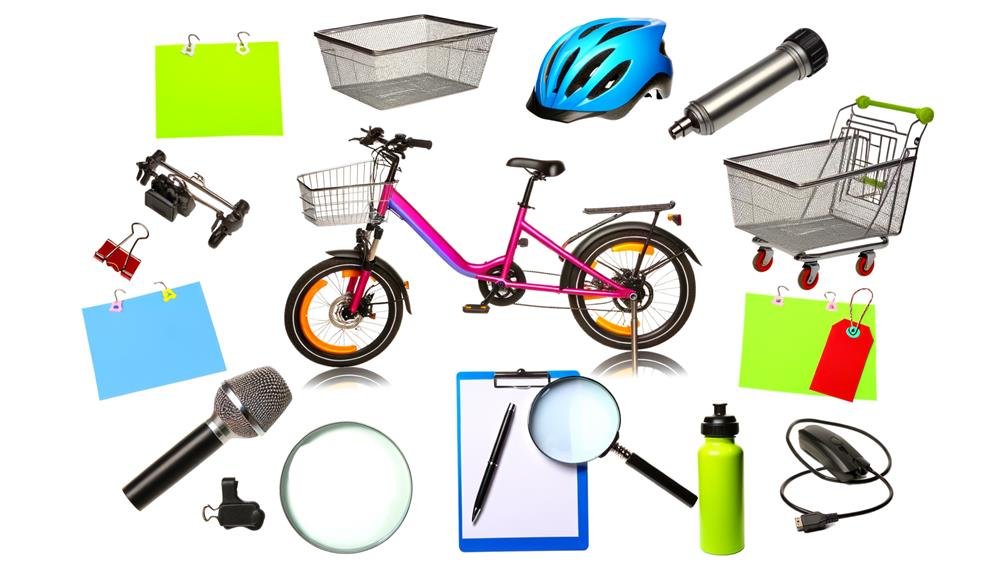Charles Miller is a veteran bike enthusiast with over 12 years of experience dealing with bikes as a mechanic. Despite immense love and expertise for...
The weight of a specialized e-bike, an increasingly popular mode of transportation known for its ability to combine physical exertion with the ease of motorized assistance, is a significant factor contributing to its overall performance and user experience. Roughly tipping the scales at around 50 pounds, this weight encompasses all integral parts such as the motor, battery, and the bike frame itself. However, the weight is not a static figure: it can fluctuate depending on the specific model and the components used.
Therefore, understanding the weight of an e-bike before making a purchase is crucial as it directly impacts its handling, transportation, and how it performs under rider's weight. Let us unfold the factors that constitute the weight of an e-bike and how it influences the performance of these specialized machines.
- Key Takeaways
- Understanding Specialized Ebike Specifications
- Impact of Weight on Ebike Performance
- Average Weight of Specialized Ebikes
- Weight Breakdown: Frame and Components
- Specialized Turbo Levo: A Weight Analysis
- Comparing Weights: Specialized Ebike Models
- Influence of Weight on Ebike Transport
- How Riders' Weight Affects Ebike Performance
- Choosing the Right Weight: Buying Guide
- Frequently Asked Questions
- Conclusion
Key Takeaways
- The weight of specialized e-bikes is influenced by factors such as the motor, battery, bike frame, components, and accessories.
- The weight of an e-bike can impact its performance in terms of motor output efficiency, battery lifespan, frame stress, riding range, and risk of breakdowns.
- The average weight of Specialized e-bike models varies, with the Specialized Levo SL being one of the lightest at 18.24kg.
- The weight of the components and frame in a Specialized Turbo Levo Expert e-bike can affect motor performance, battery life, riding range, stress on individual components, and riding position and style.
Understanding Specialized Ebike Specifications
Delving into the specifications of Specialized Ebikes, it's imperative to note the meticulous engineering behind their design, particularly the weight factors and their corresponding impacts on performance, safety, and user customization.
The Specialized Turbo Levo, a prestigious electric mountain bike, weighs 50lb and is designed for fast trail riding. Its new frame design allows a larger rear shock with an external reservoir, enhancing performance and handling.
The actual weight of the Specialized Levo Pro is slightly less, clocking in at 48.92lb for a size S5 test bike. Weight limits on ebikes are essential for safety and performance, affecting factors like range, battery life, and warranty coverage. The Levo's overall weight, inclusive of rider weight, is expertly balanced by the use of a FACT 11m Carbon Fibre frame, which provides lightweight strength and rigidity.
The 2023 Specialized Levo SL, weighing 18.24kg, comes equipped with a new SL 1.1 motor, offering improved suspension and a highly adjustable chassis. The electric mountain bike's battery capacity and motor power are designed for optimal performance, with careful consideration of the overall weight and rider's weight. This attention to detail showcases Specialized's commitment to producing top-tier ebikes.
Impact of Weight on Ebike Performance
The influence of weight on an ebike's performance is a crucial factor to consider, as exceeding the manufacturer's specified weight limits can significantly affect the motor's output and the overall lifespan of the battery. This is especially true for specialized Turbo bikes, which are designed to make riding a more enjoyable experience. Weight not only impacts the power output and battery lifespan but also places immense stress on the bike's frame.
Adding extra weight to your bike can increase the risk of motor failures and reduce your riding range. A heavier rider may put additional stress on the bike's spokes and frame which could potentially lead to breakdowns.
To illustrate this, please refer to the following table:
| Factor | Lighter Weight | Heavier Weight |
|---|---|---|
| Motor Output | High efficiency | Reduced efficiency |
| Battery Life | Longer lifespan | Shorter lifespan |
| Frame Stress | Lower | Higher |
Incorporating proper maintenance and adhering to weight regulations can help mitigate these impacts. As the new generation of Specialized ebikes continues to evolve, it's important to understand the role of weight in their performance, ensuring a long-lasting, efficient, and enjoyable riding experience.
Average Weight of Specialized Ebikes
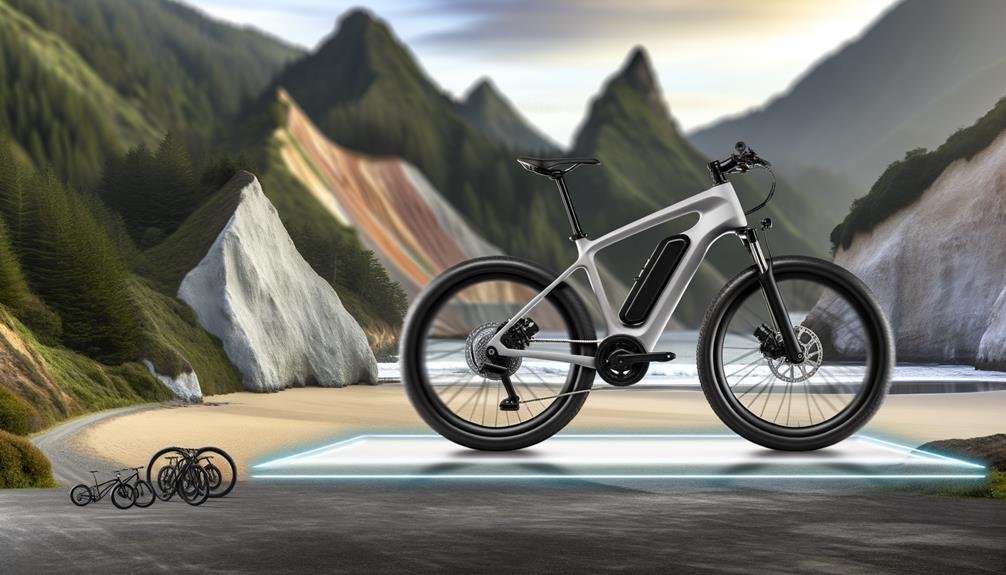
Building on the importance of weight in ebike performance, it's essential to consider the average weight of various Specialized ebike models. The Specialized Levo, a flagship model in their mountain bikes range, weighs around 50lb. This moderate weight makes it suitable for fast trail riding and offers substantial stability.
The Specialized Levo SL, part of the lighter SL range, weighs 18.24kg and offers a lightweight full-suspension e-MTB option.
A size S5 test bike of the Specialized Levo Pro, an advanced S-Works model, weighs slightly less at 48.92lb (22.19kg) without pedals. This demonstrates Specialized's commitment to optimizing weight while enhancing performance.
Comparatively, the Specialized Turbo Vado SL 4.0 EQ, one of the lightest mid-drives available, weighs in at only 1.95kg. This streamlined weight reflects Specialized's Turbo technology's focus on creating lightweight, efficient electric bike models.
Weight Breakdown: Frame and Components
A careful examination of Specialized Turbo Levo Expert reveals that its lightweight design can be attributed to its Fact 11M carbon fiber frame and components. This new frame contributes significantly to the overall lightness of the bike without compromising its strength and durability. The bike's motor is cleverly integrated into the frame, providing a sleek, streamlined appearance and further reducing the weight.
The bike's components are equally impressive. The SRAM X01 Eagle 12-speed drivetrain and Deity Copperhead stem contribute to the bike's performance without adding unnecessary weight. The GX Eagle drivetrain, in particular, offers a wide gear range that allows riders to tackle varied terrain with ease, while the Specialized Trail grips offer superior control.
The battery, which is a crucial component of all ebikes, is also designed with weight in mind. Despite its power, it is surprisingly lightweight, contributing to the overall balanced feel of the bike. It's worth noting that the stated weight of the Specialized Turbo Levo Expert is without pedals, which are often added by riders based on personal preference.
Specialized Turbo Levo: A Weight Analysis
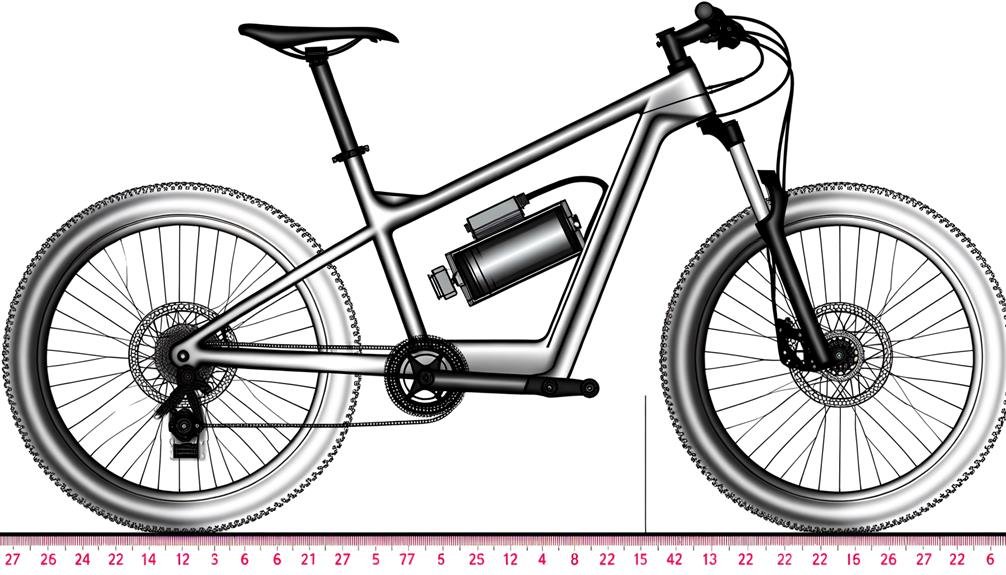
Turning our attention to the Specialized Turbo Levo, we will commence a comprehensive weight analysis.
This examination will include a detailed breakdown of Turbo Levo's weight, its potential influence on the riding performance, and a comparison with other e-bikes in the market.
This will provide valuable insights into the bike's design, performance, and value proposition.
Turbo Levo's Weight Breakdown
Analyzing the weight distribution of the Specialized Turbo Levo, a 50lb e-bike designed for fast trail riding, reveals how each component contributes to its overall weight and performance.
The new Specialized Levo's weight is a result of its comprehensive features and design considerations.
- The Trail handlebar and peak power SRAM XO1 Eagle mechanical group contribute to the bike's total capacity for speed and efficiency.
- The new Levo's Roval carbon trail wheels and Fox Factory suspension ensure a good e-bike experience over technical and flow trails.
- The Turbo mode of the bike enhances the performance, utilizable in various riding conditions.
- The Specialized/Diety cockpit and carbon handlebar contribute to the weight in stock form.
- The weight limit, specified for safety, affects range, battery life, and motor performance.
This breakdown highlights the Turbo Levo's commitment to optimal performance.
Impact on Riding Performance
Delving into the impact of weight on the performance of the Specialized Turbo Levo, it becomes evident that the meticulously distributed load directly influences the e-bike's motor performance, battery life, riding range, and even the stress exerted on individual components like spokes.
The Specialized Butcher tires, paired with the bike's weight, offer a grounded and stable ride during mountain biking and trail riding.
The weight, distributed between the front and rear end, affects the riding position and style, impacting on riding performance. A heavier test bike may require a more aggressive riding style, with the rider leaning forward for more power.
The weight also affects the battery life and riding range, making weight consideration an essential factor when choosing a Turbo Levo for trail adventures.
Comparing With Other Ebikes
Drawing comparisons with other e-bikes in terms of weight, the 2021 Specialized Turbo Levo, weighing in at 50lb, stands as a benchmark in the realm of fast trail riding. This ebike, known for its full power output, positions itself as a heavyweight champion in the Performance Line.
The Levo SL models, on the other hand, are the best lightweight alternatives, weighing just 18.24kg each. The Peak torque of these SL models delivers a powerful punch despite their lightweight nature. With a Range Extender, these e-bikes promise extended rides on a single charge.
The Levo SL is built for those desiring a blend of power and portability. Nevertheless, the Turbo Levo, with its robust build, offers a unique riding experience, inviting riders to belong to a community of power-loving trailblazers.
Comparing Weights: Specialized Ebike Models
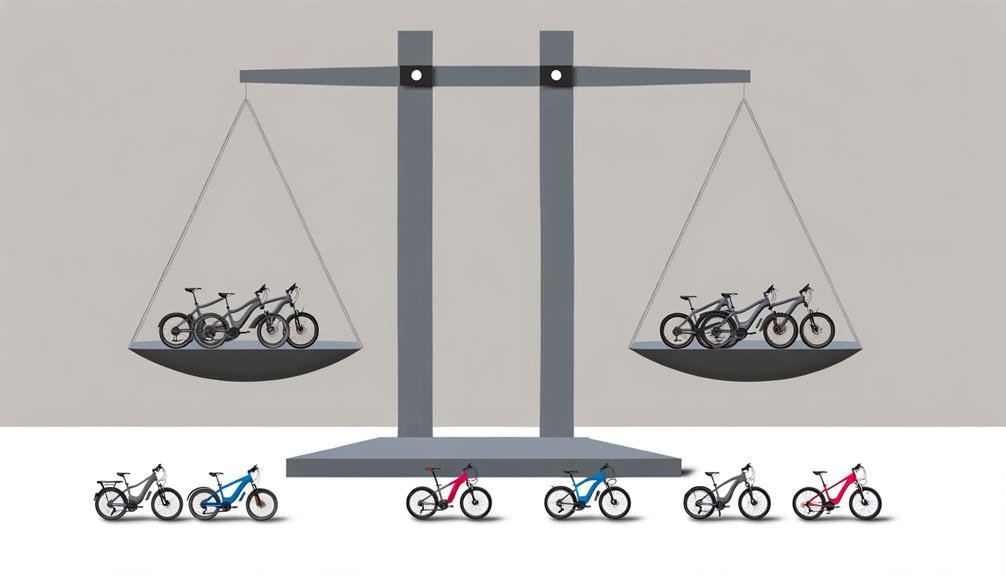
When comparing the different models of Specialized Ebikes, it becomes apparent that the weight of each model varies significantly.
For instance, the 2021 Turbo Levo and the Levo Pro in size S5 differ in weight by more than a pound.
It is essential to understand these weight differences and how they may impact the rider's experience and the bike's performance.
Specialized Ebike Models Overview
In comparing the weights of various Specialized Ebike models, the 2021 Turbo Levo, weighing in at 50lb, is designed specifically for quick trail riding, while the 2023 Levo SL Comp Carbon, with a weight of 18.24kg, showcases a lightweight full suspension e-MTB design. Both models feature the MasterMind TCU and the Mastermind display, enhancing their technological prowess.
The Turbo Levo, with its heavier weight, may drain the battery quicker, yet it offers robustness with its Fox Factory suspension and SRAM Code RS brakes.
The Levo SL Comp Carbon, lighter in weight, features an Eagle drivetrain, Fox Float X rear shock, and accommodates a water bottle, making it a versatile choice.
These differences highlight the company's commitment to provide a model for every rider, ensuring a sense of belonging within the Specialized Ebike community.
Analyzing Ebike Weight Differences
How do the weight differences among Specialized Ebike models influence their performance and versatility?
Notably, weight impacts an ebike's performance, battery life, and range.
For example, the Levo Pro, with its carbon handlebar and GRID Trail casing tyres, weighs less than the Turbo Levo, offering improved versatility for climbing positions and longer rides.
Through the Mission Control, riders can adjust the bike to its lowest weight, optimizing its performance.
However, exceeding the weight limits can compromise these features.
Hence, it's crucial to consider your riding style and the bike's weight capacity.
For more information, consult the manufacturer's guidelines or their YouTube channel, which provides a huge amount of knowledge on this topic, including how heart rate influences ebike performance.
Influence of Weight on Ebike Transport
Understanding the influence of weight on e-bike transport is crucial, as it directly affects motor performance, battery life, and riding range. The weight of your e-bike can significantly influence its transportability, especially when considering factors like the bottom bracket, seat tube, chainstay length, top tube, and steerer tube measurements. The weight also affects the mounting points and headset cups engagement, which can impact the bike's overall stability and handling.
Here are some considerations to evoke your understanding:
- A heavier e-bike may offer a sturdier seat angle and a more robust Dropper post.
- Overweight can cause damage to the frame and components, affecting your warranty.
- Rider weight, cargo, and accessories need to be factored in while choosing the e-bike model.
- Heavier e-bikes might reduce battery life and riding range.
- Proper maintenance can mitigate the impact of weight on e-bike performance.
Being part of the e-biking community means understanding these elements, thereby ensuring a more enjoyable and sustainable biking experience.
How Riders' Weight Affects Ebike Performance
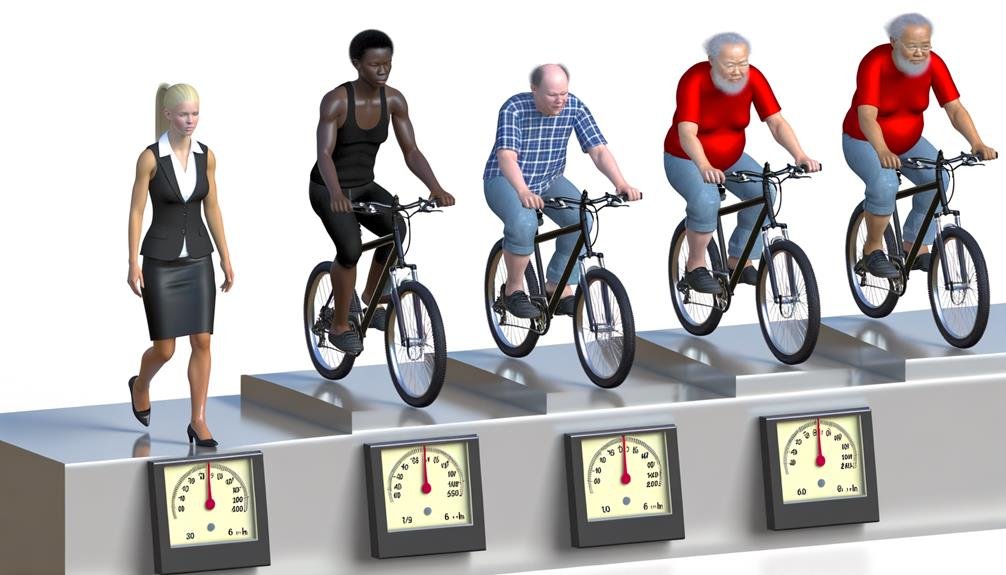
Examining the impact of a rider's weight on e-bike performance reveals significant implications for acceleration, braking, maneuverability, and overall ride quality. A heavier rider might find that a bike that's comfortable and neutral in handling for a lighter person becomes less responsive around tight corners and less confidence-inspiring on steep, technical terrain.
Front and rear braking systems may also be affected, as higher weight can lead to longer stopping distances. The additional load also places more strain on the battery, perhaps causing one day of anticipated range to fall far behind though. It's crucial to consider the manufacturer's specified weight limits, not only for safety and optimal performance but also to maintain warranty coverage.
For those near or exceeding these limits, e-bike models with higher weight capacities are well suited. It's important to consult with manufacturers or dealers for guidance.
Rider weight is not something to overlook; it plays a significant role in your e-biking experience. Understanding how it impacts performance leads to informed decisions, ensuring a ride that's both enjoyable and efficient.
Choosing the Right Weight: Buying Guide
Selecting the appropriate weight for your e-bike, a decision that encompasses factors such as rider weight, cargo, and accessories, is a critical step in ensuring optimal performance, safety, and longevity of the battery.
To discern the right weight, consider the following:
- Slacker Head Angle: A slacker head angle keeps the front wheel further out, providing stability. This is beneficial for heavier riders or those carrying substantial cargo.
- Flip Chip: A flip chip allows you to adjust the bike's geometry, helping to balance the load more efficiently.
- Headset Cup & Horst Pivot: These components, when Highly Adjustable, can help accommodate different weights and riding styles.
- Compression and Rebound: Adjusting these parameters in your suspension system can help manage heavier loads, providing a smoother ride.
- Tire Selection: Consider the Eliminator T or Butcher T tires, which are durable and provide excellent grip, particularly crucial for heavier riders or loads.
When you select a specialized e-bike, consider your unique weight needs. Doing so will not only extend the life of your e-bike but also ensure a safer, more effective, and enjoyable ride.
Frequently Asked Questions
How Much Does a Specialized E-Bike Weigh?
Specialized e-bike models vary in weight due to factors such as battery impact, frame influence, and ebike materials used. Weight distribution also affects comfort, portability, and towing capacity, necessitating attention to weight limitations.
How Heavy Is a Specialized Levo?
The Specialized Levo, known for its durability and riding comfort, weighs between 48.92lb and 50lb. Its weight is influenced by factors such as frame materials, battery capacity, suspension system, and assembly components.
How Much Does an Electric E-Bike Weigh?
The weight of an electric e-bike, determined by battery weight, frame materials, and e-bike components, impacts its portability, weight distribution, performance, and transportation challenges. Customization options can alter weight limits affecting overall use and rider experience.
What Is the Lightest Specialized E-Bike?
The lightest models of Specialized e-bikes, utilizing advanced Specialized technology and ebike materials, such as the Vado SL 4.0 EQ, weigh as little as 1.95kg. This weight reduction enhances performance, portability, and design influences.
Conclusion
In conclusion, the weight of a specialized e-bike, averaging around 50 pounds, plays a pivotal role in performance, handling, and transport. It's not just about riding like the wind, but understanding the weight dynamics can make or break your e-biking experience.
Selecting a suitable weight based on personal needs and preferences is therefore crucial when purchasing an e-bike. Remember, knowledge is power when it comes to navigating the ever-evolving world of e-biking.

Charles Miller is a veteran bike enthusiast with over 12 years of experience dealing with bikes as a mechanic. Despite immense love and expertise for his Tacoma, he rides his Trek Ebike more. Anytime you meet him, you’ll either hear him talking about Bikes, or writing about all things bikes and cars on this blog.
More Posts
